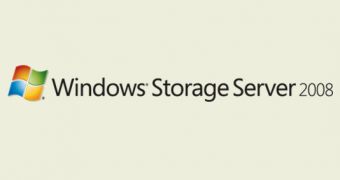Despite all the focus being on Windows 7 and Windows Server 2008 R2, Microsoft is developing other operating systems, and has released to manufacturing Windows Storage Server 2008. Bala Kasiviswanathan, director of Storage Solutions Marketing at Microsoft, reveals that Windows Storage Server 2008 is now available to original equipment manufacturers. With this flavor of Windows Server 2008, the Redmond company is attempting to provide customers with fully configured hardware and OS (software) storage products.
“Sure, you could go buy a copy of Windows Server 2008 on DVD and build your own file server from your favorite server hardware vendor – mine being torn between HP and Dell, since I grew up in Texas. But why? This is built on the same base, but comes out of the box and serving data within 30 minutes (not including messing with server-rack rails). But Microsoft takes the OS, tweaks it from its default settings to optimize it for file services, and then adds extra file/storage capabilities,” reveals Jason Buffington, senior product manager in Windows Storage.
Of course, at the basis of the Windows Storage Server 2008 is Windows Server 2008's file services platform. However, the Redmond company emphasizes that in terms of storage technologies WSS supersedes Windows Server. Buffington explains that this is the reason for the delayed availability of Windows Storage Server in comparison to the plain vanilla Windows Server. Essentially, Windows Storage Server 2008 adds new capabilities, tweaks and optimizations on top of what Windows Server 2008 delivers out of the box.
“Microsoft adds de-duplication (Single Instance Storage) which is as hot a topic in IT as anything today. And the iSCSI Software target lets you offer block storage and file service in the same appliance. Then, the OEM hardware partners take their ‘stock’ hardware – like a Dell PowerEdge – and make it a PowerVault (with more tweaks and additions). File Serving is one of the most popular uses for Windows Server, so why not get it as tricked out as possible – from the same hardware and software vendors that you already trust for the rest of your server infrastructure (instead of a proprietary NAS filer),” Buffington adds.

 14 DAY TRIAL //
14 DAY TRIAL //